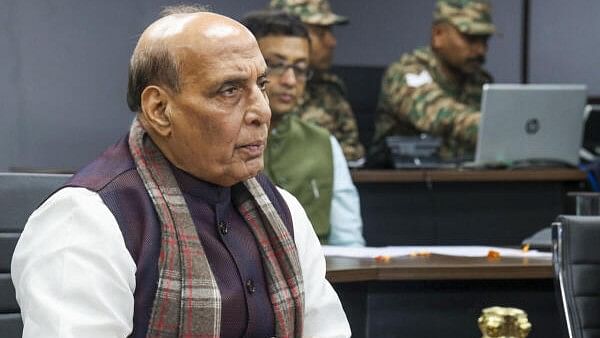
Union Minister of Defence Rajnath Singh virtually unveils the ‘Desh ka Vallabh’ statue of Sardar Vallabhbhai Patel and the Major Ralengnao ‘Bob’ Khathing ‘Museum of Valour’, at Tawang, Arunachal Pradesh.
Credit: PTI Photo
New Delhi/Guwahati: Even as Indian troops offered sweets to Chinese soldiers to celebrate Diwali, Defence Minister Rajnath Singh on Thursday said “it would take some time to take the consensus agreement beyond disengagement”, dropping a clear hint of no immediate withdrawal of troops from eastern Ladakh.
“India and China have been holding talks at both diplomatic and military levels to resolve the differences in some areas along the LAC. As a result of the talks, a broad consensus was developed on the basis of equal and mutual security. The consensus includes the rights of patrolling and grazing in traditional areas. Based on this consensus, the process of disengagement is almost complete,” he said.
“Our efforts will be to take the matter beyond disengagement; but for that, we will have to wait a little longer,” the minister said, participating at an event at the 4 Corps headquarters in Tezpur.
Earlier in the day, Indian soldiers gave Diwali sweets to the People’s Liberation Army troops at five locations near the Line of Actual Control – Chushul, Kangka La, DBO, Karakoram pass and Hot Springs.
Some of these sites were witness to hostile posturing in the last four and half years.
The two sides will kick off the patrolling shortly as the disengagement process has been completed.
But notwithstanding the disengagement, sources said, restoration of trust would take time and subsequent steps like de-escalation and de-induction could happen only after both sides expressed high levels of trust.
Since the flare-up in April 2020, more than 50,000 troops from either side have been deployed in eastern Ladakh along with tanks, howitzers, missiles and surveillance equipment.
Regular monitoring of the activities along the LAC and regular meetings between the ground-level commanders and at Brigade headquarters would continue.
Troops are forward deployed in other locations as well along the 3,488 km long LAC, particularly in the north east and discussions are on between the two sides to ease the tensions at areas like Yangste and Asaphila that are among the 25 contested spots on the LAC.
Singh virtually addressed the jawans from Tezpur as his plan to celebrate Diwali with the soldiers at Tawang, sharing border with China, had to be cancelled on Wednesday due to inclement weather.
He said the disengagement agreement could be signed due to discipline and valour of the Indian forces along the border with China.
Rajnath inaugurated a statue of Sardar Vallabhbhai Patel and a "Museum of Valour" at Tawang.
The event at Tawang is significant given China's repeated claims over Arunachal Pradesh and objections to visits by Indian Ministers, Dalai Lama and other officials to the frontier state. India, however, rejected China's claims and asserted that Arunachal Pradesh is an integral part of India.
Arunachal Pradesh Governor Lt Gen KT Parnaik (Retd), Chief Minister Pema Khandu, Union Minister Kiren Rijiju, Manipur CM N Biren Singh and Chief of the Army Staff General Upendra Dwivedi attended the event at Tawang, according to an official statement.
Earlier this month, the Indian Army opened a new culture and heritage museum in Arunachal Pradesh establishing the border state’s “deep rooted connection to Indian civilisation” to counter China’s claims of the north eastern state as its own territory.
Singh paid tributes to Sardar Patel, acknowledging his instrumental role in unifying over 560 princely states post-independence.
He also paid homage to Major Bob Khathing, an extraordinary figure who made invaluable contributions to the Northeast region and national security.
Major Khathing not only led the peaceful integration of Tawang into India but also established essential military and security frameworks, including the Sashastra Seema Bal, Nagaland Armed Police, and the Naga Regiment.
